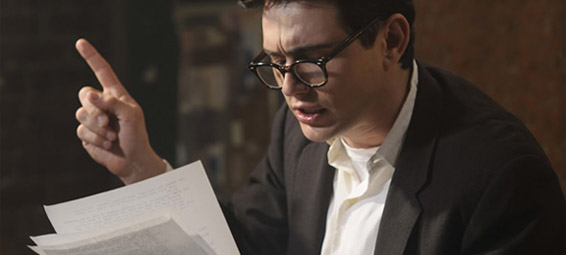Writer and directing team Rob Epstein and Jeffrey Friedman have attempted cinematic suicide. They have tried to make a movie about a poem. Worse, they haven’t tried adapting a narrative poem, like, say, Beowulf, or El Cid, or even something like absurd like “Jabberwocky” (all works that have been adapted to the screen). No, Epstein and Friedman have chosen to make a move based on Allen Ginsberg’s Howl, a linguistically wandering, deeply subjective, surreal emotional explosion – a poem whose meaning and pleasure is derived from the abstract associations of imagery, its incessant jazz-inspired meter, and its remarkable ability to twist language until the words seem to teeter on edge between meaning and meaninglessness. In short, the filmmakers have tried a project destined to fail: to make a movie based on a work of art whose power and value is so inextricably tied to its form, you could hardly dream of translating its medium.
Epstein and Friedman are powerful dreamers (to admire Ginsberg as much as they do, you would have to be). And they do an admirable, if ultimately unsuccessful, job with putting “Howl” on the screen. To accomplish this, they have created a kind of narrative triptych, making a movie with three separate pieces: part poetry reading, part interview reenactment, and part courtroom dramatization. Parts of this film work better than others. The interview dramatizations offer some ambitious content for the screen, serious discussion of poetry, life, morals, and art that are scarce in today’s incarnations of the popular media. The courtroom scenes piggyback on some of these literary musings, but they suffer from their own pious attachment to Ginsberg and his work, making the proceedings feel like the burning of a paper villain. But the long passages of the poem that are simply read in the film fall the flattest, because the filmmakers succumb to the temptation of trying to create visual images to illustrate Ginsberg poem. Readings of the work are accompanied by bizarre, surreal animations of various scenes and images, foolishly trying to render the suggested in the concrete and obstructing the language in the process, inhibiting it from working its magic.
Ginsberg wrote his poem in 1955, and soon after its publication, his publisher was dragged into court in a case that effectively placed literary merit on trial. The result was the poet’s catapulting into fame, and in the 1960s, he emerged as one of the leading American literary figures, known as much for his work as his associations with free love, hippies, LSD, and the American left. But it was Ginsberg’s wild escapades before 1955 that make up the content of his poem “Howl” and the poet’s lingering legacy as a prophet of the Beat Generation. He wandered America with Jack Kerouac and Neal Cassidy, writing, drinking, doing drugs, falling in love, unearthing emotions, and discovering his homosexuality. The film Howl touches on all these things, primarily as they are recounted by Ginsberg, played James Franco, in his interviews.
Franco is too cute, too full of sexual charm to get Ginsberg right. Where, in archived interviews, Ginsberg’s eyes are emphatic, impassioned, relentless, or childishly mischievous, Franco’s only feel flirtatious and seductive. When Ginsberg speaks of life, and sex, and love, there is always a hint of suffering in his tone, just as his poems constantly dwell on this oxymoronic relationship between pleasure and pain. But Franco is too golden and comfortable, too invulnerable and unfettered to get at the same depth of feeling in his casual conversation. The young actor nails something in Ginsberg’s vocal cadence, but you almost wish the film simply played the real taped conversations with the actual man.
Of course, if the filmmakers did this they would have made a documentary and not this ambitious hybrid cinematic form, which, at least as an idea, seems more apt for adapting something like the poem “Howl.” And adapting “Howl” is not the movie’s singular objective. It also wants to promote the poem to new audiences, mediate on its meaning, consider the thoughts of the artist who created it, and revisit the controversies surrounding its publishing. But all these secondary intentions are undercut by the long segments dedicated to trying to render poetry on screen, in which “Howl” is more revered than read.
Film always has difficulty with the poetic because of the cinema’s rootedness in the linearity of time. It is a medium that unfolds its meanings through the succession of concrete images. Movies speak through visual language, images of things themselves and not, as with written language, words that stand for images. As a result, movies have difficulty harnessing the ambiguity and lyricism of poetry. It is a bit like trying to write a play about a symphony – you can dramatize a conversation about its themes, the context of its creation, or the biography of the composer, but the experience of the music itself can never be acted out on stage. It must be heard, and although we hear “Howl” in the movie version, the visual imagery is so obtuse and intrusive, it would have been better if the screen would have just gone black.





